
FISH PATHOLOGY
Scope & Guideline
Exploring the depths of fish disease pathology.
Introduction
Aims and Scopes
- Aquatic Animal Diseases:
The core focus is on diseases affecting fish and other aquatic species, including both viral, bacterial, and parasitic infections. - Pathogen Characterization:
Research includes detailed characterization of pathogens, including their genetic and phenotypic properties, to understand their impact on fish health. - Host-Pathogen Interactions:
Studies explore the interactions between fish hosts and pathogens, including immune responses and disease resistance mechanisms. - Disease Management and Control:
The journal emphasizes practical approaches for managing fish diseases, including vaccination, treatment protocols, and biosecurity measures. - Environmental Factors in Disease Dynamics:
Research often addresses how environmental conditions affect disease outbreaks and pathogen virulence, particularly in aquaculture settings.
Trending and Emerging
- Molecular and Genomic Approaches:
There is an increasing emphasis on molecular techniques and genomic studies to understand fish pathogens better and their interactions with hosts, which enhances the precision of disease diagnostics. - Immunology and Vaccine Development:
A significant trend is the growing focus on fish immunology and the development of vaccines, particularly as aquaculture seeks to enhance disease resistance through innovative biotechnological approaches. - Climate Change and Disease Dynamics:
Research exploring the effects of climate change on fish health and disease outbreaks is gaining traction, reflecting concerns over how environmental changes impact pathogen virulence and host susceptibility. - One Health Approach in Aquaculture:
The integration of One Health perspectives, which consider the interconnectedness of human, animal, and environmental health, is increasingly recognized as essential for addressing fish diseases in aquaculture systems.
Declining or Waning
- Traditional Pathogen Control Methods:
There is a noticeable decrease in studies focusing on traditional methods of pathogen control, such as the use of antibiotics and chemicals, as the field moves towards more sustainable practices. - Generalized Disease Surveys:
Fewer publications are dedicated to broad surveys of fish diseases without specific hypotheses or targeted investigations, indicating a trend towards more focused and mechanistic studies. - Invasive Species Impact:
Research addressing the impacts of invasive species on fish health and disease dynamics has diminished, possibly due to a shift in focus towards native species and aquaculture.
Similar Journals

BULLETIN OF THE EUROPEAN ASSOCIATION OF FISH PATHOLOGISTS
Championing Excellence in Fish Health Studies.BULLETIN OF THE EUROPEAN ASSOCIATION OF FISH PATHOLOGISTS is a leading journal dedicated to advancing research and knowledge in the field of fish pathology, published by the European Association of Fish Pathologists. With its ISSN number 0108-0288, this journal has consistently contributed to the academic landscape since its inception in 1996. Based in the United Kingdom, this journal is recognized for its high-quality research output, holding a commendable Q2 ranking in both Aquatic Science and Small Animals categories as of 2023. The Scopus rankings further reflect its impact, notably securing a 10th rank in Veterinary Small Animals, showcasing its relevance and influence in the field. Although it does not offer Open Access, the content remains vital for researchers and practitioners invested in addressing the challenges associated with fish health and pathogens. The journal serves as a critical platform for sharing innovative studies, fostering collaborations, and informing ongoing developments in aquatic science. Its commitment to maintaining high standards ensures that it remains an essential resource for professionals, researchers, and students alike in pursuit of knowledge on fish pathology and aquatic health.
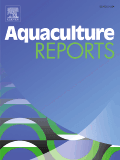
Aquaculture Reports
Exploring Innovative Solutions in Aquatic ScienceAquaculture Reports, published by Elsevier, is a prominent open-access journal dedicated to advancing knowledge in the fields of aquaculture, aquatic science, and animal science. Since its inception in 2015, this journal has quickly established itself as a leading platform for high-quality research, achieving a remarkable Q1 ranking in both Animal Science and Zoology and Aquatic Science as of 2023. With a Scopus ranking placing it in the top 7% of journals in Agricultural and Biological Sciences, Aquaculture Reports serves as an essential resource for researchers, professionals, and students alike, facilitating the exchange of innovative ideas and cutting-edge findings. The journal is indexed under ISSN 2352-5134 and is committed to fostering open access, ensuring that the latest research is readily available to the global scientific community. As it converges its years of publication from 2015 to 2024, Aquaculture Reports continues to shape the future of aquaculture research through rigorous peer-reviewed articles and impactful studies.
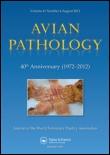
AVIAN PATHOLOGY
Navigating the complexities of avian health for global impact.AVIAN PATHOLOGY is a leading academic journal published by Taylor & Francis Ltd, focusing on the field of avian health, diseases, and diagnostics. With an ISSN of 0307-9457 and an E-ISSN of 1465-3338, this esteemed journal has been serving the scientific community since its inception in 1972, with content converging until 2024. Notably recognized in the 2023 Journal Rank, it holds a Q1 category in Animal Science and Zoology, making it an essential source for researchers and practitioners alike. The journal emphasizes critical insights into avian pathology, fostering significant advancements in veterinary science and poultry health management. Although it is not open access, subscriptions provide access to high-impact reviews and original research that underpin vital practices in the industry. With its prestigious publishing lineage and impactful scope, AVIAN PATHOLOGY continues to be a cornerstone for those dedicated to understanding and improving the health of avian species worldwide.

BOLETIM DO INSTITUTO DE PESCA
Exploring the depths of animal and aquatic sciences.BOLETIM DO INSTITUTO DE PESCA, published by the Instituto Pesca, is a Brazilian journal dedicated to advancing the fields of Animal Science and Aquatic Science. With its Open Access policy adopted in 2008, the journal ensures that research is widely disseminated, fostering collaboration and innovation among researchers, professionals, and students alike. Despite its recent Q4 category rankings in the 2023 metrics for both disciplines, the journal plays a vital role in providing a platform for emerging studies and critical discussions related to aquatic ecosystems and fisheries management. Covering a wide range of topics within its scope, BOLETIM DO INSTITUTO DE PESCA publishes original research, reviews, and case studies, stimulating academic dialogue and contributing to the sustainable management of aquatic resources in Brazil and beyond. This journal is an essential resource for anyone invested in marine and freshwater biology, ecology, and conservation.
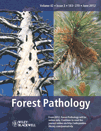
FOREST PATHOLOGY
Connecting Research and Practice in Forest PathologyFOREST PATHOLOGY is a premier journal published by Wiley that focuses on the intricate relationships between trees, pathogens, and forest health. With an ISSN of 1437-4781 and an E-ISSN of 1439-0329, this British journal has garnered an impressive reputation in the fields of Ecology and Forestry, achieving a Q2 Quartile ranking in both categories as of 2023. The journal invites researchers and professionals to explore cutting-edge studies and case reports that delve into forest pathology, contributing to the understanding of disease dynamics and management in forest ecosystems. Currently indexed in Scopus, it ranks 61st out of 174 in the Forestry category and 214th out of 461 in Ecology, reflecting its impact and relevance in advancing the field. Access options are available to cater to a wide audience, emphasizing the journal's commitment to disseminating vital knowledge that enhances forest management practices and ecological resilience. FOREST PATHOLOGY stands as an essential resource for those dedicated to the health and sustainability of forest ecosystems.
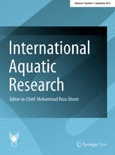
International Aquatic Research
Connecting researchers to the pulse of aquatic ecosystems.International Aquatic Research, published by the Islamic Azad University, Tonekabon Branch, is a vital open-access journal dedicated to advancing the field of aquatic sciences since its inception in 2009. With an ISSN of 2008-4935 and an E-ISSN of 2008-6970, the journal plays a significant role in disseminating high-quality research findings from Iran and around the globe. It covers a broad range of topics in aquatic biology, fisheries science, and marine ecology, making it a valuable resource for researchers, professionals, and students alike. As of 2023, it ranks in the third quartile (Q3) of the aquatic science category with a Scopus rank of #138 out of 247 in Agricultural and Biological Sciences, reflecting its growing influence in the field. With a commitment to promoting scientific knowledge and fostering collaboration among aquatic research communities, International Aquatic Research is positioned as an essential platform for those dedicated to understanding and conserving marine and freshwater environments.
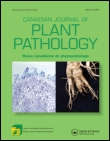
CANADIAN JOURNAL OF PLANT PATHOLOGY
Unraveling the complexities of plant diseases for agricultural advancement.Canadian Journal of Plant Pathology, published by Taylor & Francis Inc, is a leading academic journal dedicated to advancing the field of plant pathology, with a significant focus on the interplay between plant health and environmental factors. Established in 1979, this journal has established a reputation for high-quality research, currently holding a commendable impact factor within its category. As of 2023, it ranks in the Q2 quartile for both Agronomy and Crop Science as well as Plant Science, highlighting its importance and influence in these domains. With an impressive ranking of 142/516 in Plant Science and 115/406 in Agronomy and Crop Science according to Scopus, the journal is positioned within the 72nd and 71st percentiles, respectively. The Canadian Journal of Plant Pathology serves as a vital platform for researchers, professionals, and students aiming to contribute to the understanding of plant diseases, fostering innovation and development in agricultural practices.

JOURNAL OF PLANT PATHOLOGY
Illuminating the Pathways of Plant HealthJOURNAL OF PLANT PATHOLOGY, published by SPRINGER, is a premier academic journal dedicated to advancing the understanding of phytopathology and related fields. With a strong international presence and an impact factor that reflects its influence in the scientific community, this journal offers essential insights to researchers, professionals, and students engaged in plant health. Since its inception in 1997, it has consistently provided a platform for innovative research, contributing to the Q2 rank in Plant Science as per the 2023 category quartiles. The journal covers a broad spectrum of topics related to plant diseases, their management, and the ecological impacts they pose, ensuring relevance to contemporary challenges in agriculture and sustainability. While the journal does not currently offer Open Access options, it remains a crucial resource for those looking to deepen their knowledge and bolster their research endeavors in the vital area of plant pathology.
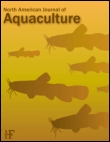
NORTH AMERICAN JOURNAL OF AQUACULTURE
Empowering aquatic ecosystems through impactful research.North American Journal of Aquaculture, published by Wiley, is a premier resource in the field of aquatic science, dedicated to advancing knowledge and research in aquaculture practices across North America. With an ISSN of 1522-2055 and E-ISSN of 1548-8454, this journal serves as an essential platform for researchers, industry professionals, and students focusing on sustainable practices, species cultivation, and aquatic ecosystems. Notably, it ranks in the Q3 category in Aquatic Science according to the 2023 metrics, and stands at the 135th position out of 247 in the Scopus rankings for Agricultural and Biological Sciences—Aquatic Science, reflecting its contribution to the field. As the journal continues to evolve through its converged coverage from 1999 to 2024, it remains committed to disseminating impactful research while providing open access options to facilitate broad readership and engagement. The North American Journal of Aquaculture aims to inspire innovative solutions for the aquaculture sector while fostering a collaborative environment for aquatic science research.
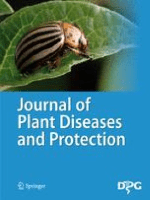
Journal of Plant Diseases and Protection
Fostering Global Collaboration in Plant ScienceThe Journal of Plant Diseases and Protection, published by SPRINGER HEIDELBERG in Germany, is a premier platform for the dissemination of cutting-edge research in the fields of Agronomy, Horticulture, and Plant Science. With its Q2 ranking in multiple categories as of 2023, this journal stands out in the academic landscape, highlighting its strong performance with a notable Scopus rank of 22nd in Horticulture and placing in the top percentile for Agronomy and Plant Science. The journal spans from 2006 to 2024, making it a valuable resource for researchers, professionals, and students seeking to stay abreast of advancements in the understanding of plant diseases and their protection. The Open Access options further enhance its accessibility, fostering a global exchange of knowledge essential for addressing contemporary agricultural challenges.